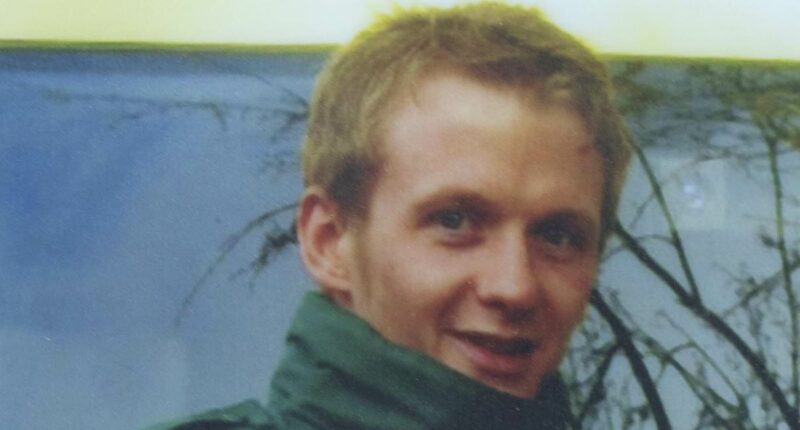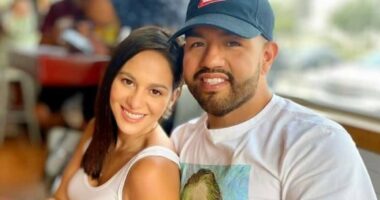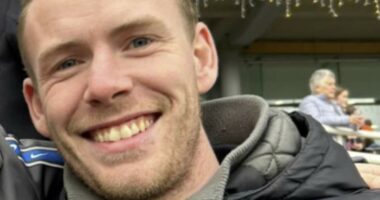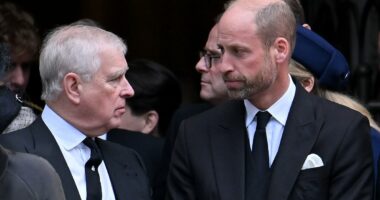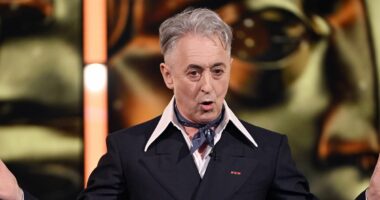Share this @internewscast.com
David Hodgkinson cherishes traditional ways of keeping in touch, favoring a heartfelt phone conversation with his friend Jacob Dunne.
“A lot more gets accomplished that way,” shares 67-year-old David. “We chat about various things, just everyday life.”
Jacob echoes this sentiment, saying, “I get updates about his family, the allotment, and everything else happening in his world.”
“Jacob and I share a deep understanding,” David, a retired landscape gardener, adds. “I’d be the first to defend him if someone criticized him unjustly.”
At 33, Jacob reflects on his bond with David and also with David’s former wife, Joan Scourfield, whom he has known for over ten years.
“I consider them friends,” Jacob remarks with a smile.
All of which is astounding when you learn that 14 years ago Jacob, then 19, killed David and Joan’s son James Hodgkinson, 28 – a complete stranger – flooring him with a single punch in an unprovoked attack one hot July night in Nottingham city centre.

(L to R) David Hodgkinson, Joan Scourfield and Jacob Dunne. David and Joan have taken the incredible step of befriending their son’s killer

Jacob Dunne with James’s mother Joan. They meet often, share a common purpose and work towards similar goals

James Hodgkinson (pictured) was killed with a single punch to his head
James – tall, handsome, public-spirited – had a life rich in promise ahead of him. A paramedic and a volunteer with the disadvantaged, he was loving and loved in return by his family and friends.
Meanwhile, Jacob was drifting purposelessly through life. A small-time drug dealer, he says he was ‘fired by an inner rage’ and misguided loyalty to his gang, whom he tried to ‘impress with violence’.
Jacob, who admitted to James’s manslaughter, served just 14 months of a 30-month prison sentence for his crime. After his release, it seemed that he might lapse into his old ways.
‘I came out of prison with no qualifications, no fixed address, no hope or prospects. I felt doomed to a life of crime. I had a label. I was a violent person.’
So how has the extraordinary reconciliation between Jacob and the two people he has hurt so grievously, happened? And how has Jacob found purpose in a productive new life?
It’s a story that has inspired a play – Punch – by the acclaimed playwright James Graham (Dear England, Sherwood), which opened last month to huge critical acclaim in the Apollo Theatre in the West End and on Broadway.

James aged 26. Tall, handsome, public-spirited, he had a life rich in promise ahead of him. A paramedic and a volunteer with the disadvantaged, he was loving and loved in return by his family and friends

By comparison, his killer Jacob (pictured now) was drifting purposelessly through life. A small-time drug dealer, he says he was ‘fired by an inner rage’ and misguided loyalty to his gang, whom he tried to ‘impress with violence’
After their son’s senseless death, Joan and David sought answers from Jacob.
‘I didn’t understand why Jacob had attacked my son then run away. At the time I just wanted to kill him,’ says David, talking exclusively to the Daily Mail about his extraordinary bond with Jacob.
‘It’s a normal human reaction. If there had been some provocation you’d get it, but there had been none. It made absolutely no sense.’
Joan adds: ‘To begin with I was bitter and angry, mostly at the justice system. Jacob was in prison for such a short time. I thought James’s life was worth more than that. What kind of a deterrent was it?’
But Jacob, to their surprise, agreed to answer their questions, with Restorative Justice practitioners at the charity Remedi acting as intermediaries. He also agreed to keep them posted on plans he’d made to go back into education.
Then, two-and-a-half years after his release from prison, when Jacob had gained top grades in his GCSEs and secured a place at university, Joan and David finally came face-to-face – again an intermediary was present – with the young man who had killed their son.
And when they met, Jacob was genuinely remorseful; eager to make amends.
‘He just seemed very vulnerable, someone who really needed our support,’ Joan recalls. ‘I wanted him to do something constructive with his life, to stop him going back to his old ways – but for a while I thought that by helping him I was betraying James.

The story of James’s death – and Jacob’s redemption – has inspired a play called Punch, by the acclaimed playwright James Graham (Dear England, Sherwood), which opened last month to huge critical acclaim in the Apollo Theatre in the West End and on Broadway
‘But that isn’t so. I still love and miss James just as much. I just couldn’t carry the resentment with me any longer.’
Has she forgiven him?
‘To the extent that I know he didn’t want to hurt James seriously. Obviously he threw the punch but there was no intent [to kill him].’
And how has forgiveness helped her state of mind?
‘It makes you lighter. You no longer carry that burden of bitterness. But it is a process. It took me a long time. But yes, eventually I forgave Jacob and it felt like a release.’
Since that first, tentative meeting, much has changed in Jacob’s life.
A father of two, he gained a first-class degree in Criminology and wrote a memoir – Right from Wrong – which was the inspiration for the play.
He renounced his old ‘friends’ and now campaigns with Joan and David to educate young people on the dangers of violence and on the potentially fatal force of even one punch.
They give talks on the redemptive power of forgiveness, too, and Jacob mentors young offenders, encouraging them into education.
But their latest mission is to make it a legal right for all victims of crime to have the chance to meet the perpetrators and have launched a petition to Government, through the Common Ground Justice Project, to enshrine this right in law.
Ministry of Justice figures show reoffending currently costs British taxpayers £18billion a year and 90 per cent of victims do not consider the justice system to be effective.
But when victims are given the chance to meet offenders the project has impressive results. Reoffending is cut by 25 per cent and the taxpayer saves £14 for every £1 spent. Despite this, only one in 20 victims are currently told about the scheme.
Jacob is passionately committed to change: ‘Let’s put victims at the heart of our justice system, and give them every opportunity to move forward, get questions answered and hold perpetrators accountable.
‘The justice system, like many victims of crime, is stuck. And we want to move it forward beyond the noisy polarised debate.
‘Many prisoners do not have the opportunity to express remorse. They are in a cell. How can they? But many tell me: “I want to reach out but I don’t know where to start.”
He insists that this is not a soft option: ‘When I first met Joan and David I was petrified. My heart was beating fast. I went into the room and Joan started telling me about James, what he was like; that he’d had a girlfriend, loved doing adventurous things.
‘I only began to appreciate the full impact of what I’d done when I learned about James and the values he lived by. It brought it all home. I cried.
‘I don’t think prison should be a walk in the park, either,’ he goes on. ‘Offenders should serve their sentences first. They should be punished. But when they come out we want them to be employable, not to become more aggressive and commit more crime, but to contribute to society.’
He believes the first step must be an obligation for offenders to be present in court to hear their victims’ impact statements.
Currently, it’s not mandatory. Triple murderer Kyle Clifford, who killed Carol Hunt and two of her daughters, refused to appear in court to hear John Hunt – husband and father to the victims – read a moving statement.
Axel Rudakubana, 19, also avoided facing his victims’ families when he was sentenced to a minimum of 52 years for murdering three children in Southport.
David agrees that criminals should be forced to attend: ‘It shows a level of cowardice if a perpetrator does not even show up to face their victim in court. And offenders should not be involved [in restorative justice] to try to get a lesser sentence. You have to know the remorse is genuine, that they’ve served their time first.
‘You’re not guaranteed a good outcome either and it has to be voluntary. But we’re saying every victim must have access to this scheme.
‘I feel great gratitude to Jacob that he wanted to meet us and we all came out of it better. “Lock them up and throw away the key” doesn’t help you get the anger out of your system.’

James aged two. His parents say that the loss of their boy and his future makes complete forgiveness hard to bear, but it would not have helped their pain if Jacob’s life had been wasted too
Joan adds: ‘And it would not have helped my pain if Jacob’s life had been wasted too.’
A former A&E nurse who works in mental health, she is smiley and warm. When she and Jacob hug, he towers over her.
‘We’re often in touch,’ she says. ‘We get on very well. Jacob will always update me on how his kids are getting on. I try to support him, to give advice.’
They cast their minds back to the awful night of July 31, 2011, when all their lives changed irrevocably.
James had been watching the cricket with his dad at Trent Bridge, Nottingham. Afterwards, they’d gone for drinks in the city centre, dressed in pirate costumes and in high spirits.
Jacob, pumped up on cocaine, ecstasy, cheap champagne and vodka, was roaming the city centre bars with his gang from Nottingham’s notorious Meadows Estate.
For them, mindless violence was integral to a night out.
‘They’d argue with anyone about anything and I vaguely recall some girls trying to pull them away from a group of lads. I took it upon myself to get involved,’ says Jacob.
‘I just used to enjoy the adrenaline rush of it all.
‘I remember punching James, just once, on the jaw and seeing him fall over. There was no motive, no provocation; absolutely no intention to do him serious harm, let alone kill him.
‘But he fell back and hit the ground. I was instantly aware that something was badly wrong.
‘He was unconscious and I didn’t want that to happen, never intended it to. I ran away. I was scared.’
David meanwhile recalls: ‘I was in a state of shock, and I didn’t realise how much damage had been done to James. He’d been knocked unconscious then he came round.
‘We went in the ambulance to hospital and they just said he’d been drinking, that he should sleep it off.
‘Only later did we realise how serious it was. He had to have an operation that night.’
The blow as James cracked his head had caused a blood clot. Medics hoped he’d pull through. He was a fit young man. But his injuries proved catastrophic.
Joan recalls: ‘His brain swelled. He did not respond to treatment. More blood clots formed and he was put on a life-support machine… nine days later we made the heart-breaking decision to turn off the machine.
‘The moment I walked out of intensive care to tell the family that James had passed away, the homicide team were waiting for me. From then on, instead of being able to grieve and bury James, our focus had to be on the investigation.’
Although divorced, Joan and David were united by their shared loss.
But Jacob, unaware that James had died, had gone on holiday with his mum and younger brother. He remembers his ‘pure panic and disbelief’ when he returned to find he faced a murder charge.
‘Even though I didn’t have much to offer the world, this was not how I imagined my life panning out… I was scared.’
The charge was reduced to manslaughter. Jacob pleaded guilty.
Prison only stoked his anger and self-pity and he left prison with scant hope and no prospects.
‘A few of my old “friends” let me sofa-surf, then I went into a homeless hostel and finally a one-bedroom flat. I didn’t have a job. I didn’t even have a CV, let alone anything to put on it.’
Jacob’s crime had catastrophic repercussions on his family, too. His mum, a single parent of two sons – Jacob’s brother is seven years younger – lost her childminding job because of his conviction.
Meanwhile Jacob was ‘feeding into any narrative that helped avoid taking responsibility’.
It was Joan and David’s intervention that precipitated a real change in him. When Joan asked: ‘What are you going to do with your life now?’ Jacob said he wanted to do anything he could to support them.
‘But I said he had to sort out his own life first, get an education,’ says Joan.
Of their meeting, David recalls: ‘We were warned about all the different scenarios and prepared for what could go wrong. I was apprehensive. It wasn’t easy for any of us.
‘Actually it was harder for Jacob who was on his own and having to face us together. I think he was very brave to have come into that room to meet us.
‘And what struck me was he didn’t look anything like the thug in the awful police mugshot. As soon as he started talking I could tell his remorse was real.’
However, David feels ambivalent about forgiveness.
‘I know that Jacob did not intend to kill James when he threw that punch but I cannot say I totally forgive him because I have lost my boy and all his future and that is very hard to bear,’ he says.
‘But Jacob and I have a very good understanding of each other. I’d always defend him, always speak up for him and fight his corner.’
As Jacob says: ‘I became committed to honouring James’s life by changing. I wanted to change for Joan and David too. One life had been lost; they didn’t want another one to be wasted, too.’
David and Joan’s support was tested early on when, in 2014, Jacob’s mum died. They feared grief might pitch him back into his self-destructive life. But, buoyed by them, he worked even harder and became a carer for his brother.
‘Their belief in me fuelled my self-confidence. David and Joan saved me by giving me a second chance in life,’ says Jacob.
‘To this day I’m in awe about how they turned their anger and heartache into any sort of compassion for me. The two people I’d harmed the most with my actions had judged me the least.
‘Even though I’ll never be able to fully repay them, I wanted to continue to honour their son’s life by setting a good example for others.’
To sign the Common Ground Justice Petition go to: https://www.commongroundjustice.uk/righttobeheard
